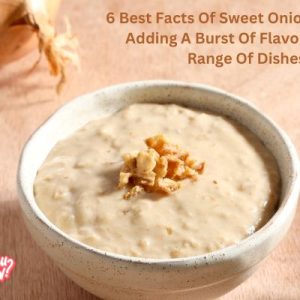Onions are a versatile and essential ingredient in many dishes, but did you know that they also have numerous health benefits? From reducing inflammation to improving heart health, the humble onion has much to offer. In this article, we’ll explore the various ways that onion nutrition can improve your overall well-being.
Introduction to Onion Nutrition Facts

Onions are part of the allium family of vegetables, which also includes garlic, shallots, and leeks. They are packed with essential vitamins and minerals, including vitamin C, potassium, and folate. Onions are also a good source of fiber, which can improve digestion and promote weight loss.
But the benefits of onion nutrition don’t stop there. Onions contain numerous phytochemicals, including flavonoids and sulfur compounds, that have been shown to have anti-inflammatory and antioxidant properties. These compounds can help reduce the risk of chronic diseases such as cancer, heart disease, and diabetes.
In the following sections, we’ll take a closer look at the specific macronutrients, micronutrients, and phytochemicals found in onions and their health benefits. So, let’s dive into the world of onion nutrition and discover how this flavorful vegetable can improve your health and well-being.
Macronutrients in Onions

Onions are a low-calorie and nutrient-dense food that contains a variety of macronutrients essential for the body’s proper functioning.
Overview of Macronutrients Found in Onions
Onions are primarily made up of carbohydrates, with a small amount of protein and fat. A medium-sized onion contains roughly 44 calories, 10 grams of carbohydrates, 1 gram of protein, and less than 1 gram of fat.
Amount of Each Macronutrient Present in Onions
Onions’ primary macronutrient is carbohydrates, which are mainly in the form of simple sugars such as glucose and fructose. Onions also contain small amounts of complex carbohydrates, such as fiber, which contributes to regular bowel movements and the maintenance of healthy gut bacteria.
Onions’ protein content is relatively small, but the sulfur-containing amino acids present in onions are essential for the production of enzymes and proteins that are vital for maintaining healthy skin, hair, and nails. Onions also contain a small amount of fat, which is mainly composed of heart-healthy monounsaturated and polyunsaturated fatty acids.
How These Macronutrients Contribute to Overall Health and Well-Being
The carbohydrates in onions provide a quick source of energy for the body, making onions an excellent pre-workout snack. The fiber in onions can lower cholesterol levels and promote satiety, making it an excellent addition to a weight loss diet.
The sulfur-containing amino acids in onions are essential for the body’s proper functioning, and they also play a crucial role in collagen production, which is essential for maintaining healthy skin and hair.
The small amount of fat in onions is mainly composed of heart-healthy monounsaturated and polyunsaturated fatty acids, which can help reduce the risk of heart disease.
In summary, the macronutrients found in onions play a vital role in maintaining overall health and well-being. Incorporating onions into your diet can provide a range of essential nutrients that can improve your health in numerous ways.
Micronutrients in Onions

Onions are a great source of essential micronutrients that are vital to maintaining good health. Let’s take a closer look at the vitamins and minerals found in onions and how they contribute to overall well-being.
Vitamins in Onions
Onions are rich in vitamins C and B6. Vitamin C is a powerful antioxidant that can help protect the body against damage from free radicals. It also plays a crucial role in the immune system, helping to fight off infections and illnesses. Vitamin B6, on the other hand, is important for brain development and immune function.
Minerals in Onions
Onions are also a good source of several essential minerals, including potassium, folate, and manganese. Potassium is important for maintaining healthy blood pressure and reducing the risk of heart disease. Folate, also known as vitamin B9, is essential for cell growth and development. Manganese is important for bone health and helps the body metabolize carbohydrates, protein, and fat.
How Micronutrients Contribute to Health
The micronutrients found in onions work together to promote overall health and well-being. Vitamin C and B6 help to support the immune system, while potassium, folate, and manganese are important for maintaining healthy bones, blood pressure, and metabolism. By incorporating onions into your diet, you can help ensure that your body is getting the essential vitamins and minerals it needs to function properly.
Phytochemicals in Onions
Onions are rich in phytochemicals, which are naturally occurring compounds found in plant-based foods. These compounds have been shown to have numerous health benefits, including reducing the risk of chronic diseases such as cancer, heart disease, and diabetes.
What are Phytochemicals?
Phytochemicals are biologically active compounds found in plants that are not essential nutrients but have been shown to have health benefits. There are thousands of different types of phytochemicals, each with its unique properties and health benefits.
Phytochemicals are responsible for the vibrant colors and flavors of fruits and vegetables, and many of them act as antioxidants, protecting cells from damage caused by free radicals.
Types of Phytochemicals in Onions
Onions contain several types of phytochemicals, including flavonoids and sulfur compounds. Flavonoids are a type of antioxidant that has been shown to reduce inflammation and improve heart health. Sulfur compounds are responsible for the pungent odor of onions and have been shown to have anti-inflammatory properties.
One of the most well-known sulfur compounds in onions is allicin, which has been shown to have antibacterial and antiviral properties. Allicin has also been shown to reduce the risk of heart disease by lowering cholesterol levels.
Health Benefits of Phytochemicals in Onions
The phytochemicals found in onions have numerous health benefits. Flavonoids have been shown to reduce the risk of cancer, heart disease, and stroke. Sulfur compounds have been shown to have anti-inflammatory properties, which can help reduce the risk of chronic diseases such as arthritis.
Onions also contain quercetin, a flavonoid that has been shown to have anti-inflammatory and antioxidant properties. Quercetin can help reduce inflammation in the body, which can reduce the risk of chronic diseases such as cancer and heart disease.
Incorporating onions into your diet is an easy and delicious way to reap the health benefits of phytochemicals. So, the next time you’re cooking, be sure to add some onions to your dish!
Onion Nutrition and Disease Prevention
Onions have been shown to have a significant impact on disease prevention, particularly when it comes to cancer, heart disease, and diabetes.
Cancer Prevention
Studies have shown that the phytochemicals found in onions, including quercetin and sulfur compounds, have powerful anti-cancer properties. These compounds can help prevent the formation of cancer cells and may even induce apoptosis, or programmed cell death, in existing cancer cells.
One study found that individuals who consumed the highest amounts of allium vegetables, including onions, had a significantly lower risk of developing stomach and colorectal cancer than those who consumed the lowest amounts.
Heart Disease Prevention
Onion nutrition can also play a crucial role in preventing heart disease. The flavonoids found in onions, particularly quercetin, have been shown to have anti-inflammatory and antioxidant properties, which can reduce the risk of heart disease.
Additionally, onions contain a specific type of flavonoid called anthocyanins, which have been shown to reduce blood pressure and improve overall cardiovascular health.
Diabetes Prevention
Onions may also be beneficial for preventing diabetes. The sulfur compounds found in onions can help improve insulin sensitivity, which can reduce the risk of developing type 2 diabetes.
One study found that individuals who consumed a high-sulfur diet had a significantly lower risk of developing diabetes than those who consumed a low-sulfur diet.
Incorporating Onion Nutrition into Your Diet
Incorporating onion nutrition into your diet is easy and delicious. Onions can be added to a variety of dishes, including soups, stews, salads, and stir-fries. Additionally, onions can be roasted, grilled, or caramelized for a sweet and savory flavor.
Overall, onion nutrition is a powerful tool for disease prevention. By incorporating onions into your diet, you can improve your overall health and reduce the risk of chronic diseases.
Conclusion
In conclusion, onions are more than just a flavorful ingredient in your favorite dishes. They are a powerhouse of nutrition that can improve your overall health and well-being. From reducing inflammation to improving heart health, onions have been shown to have numerous health benefits.
In this article, we’ve explored the macronutrients, micronutrients, and phytochemicals found in onions and how they contribute to overall health. We’ve also discussed the role of onion nutrition in disease prevention and how it can be incorporated into a healthy diet.
So, the next time you’re adding onions to your soup or salad, remember the numerous health benefits they provide. Incorporating onions into your diet is an easy and delicious way to improve your health.
To learn more about onion nutrition and its health benefits, visit onionfacts.com. As always, consult with your healthcare provider before making any dietary changes, especially if you have any pre-existing medical conditions.
Happy eating!







